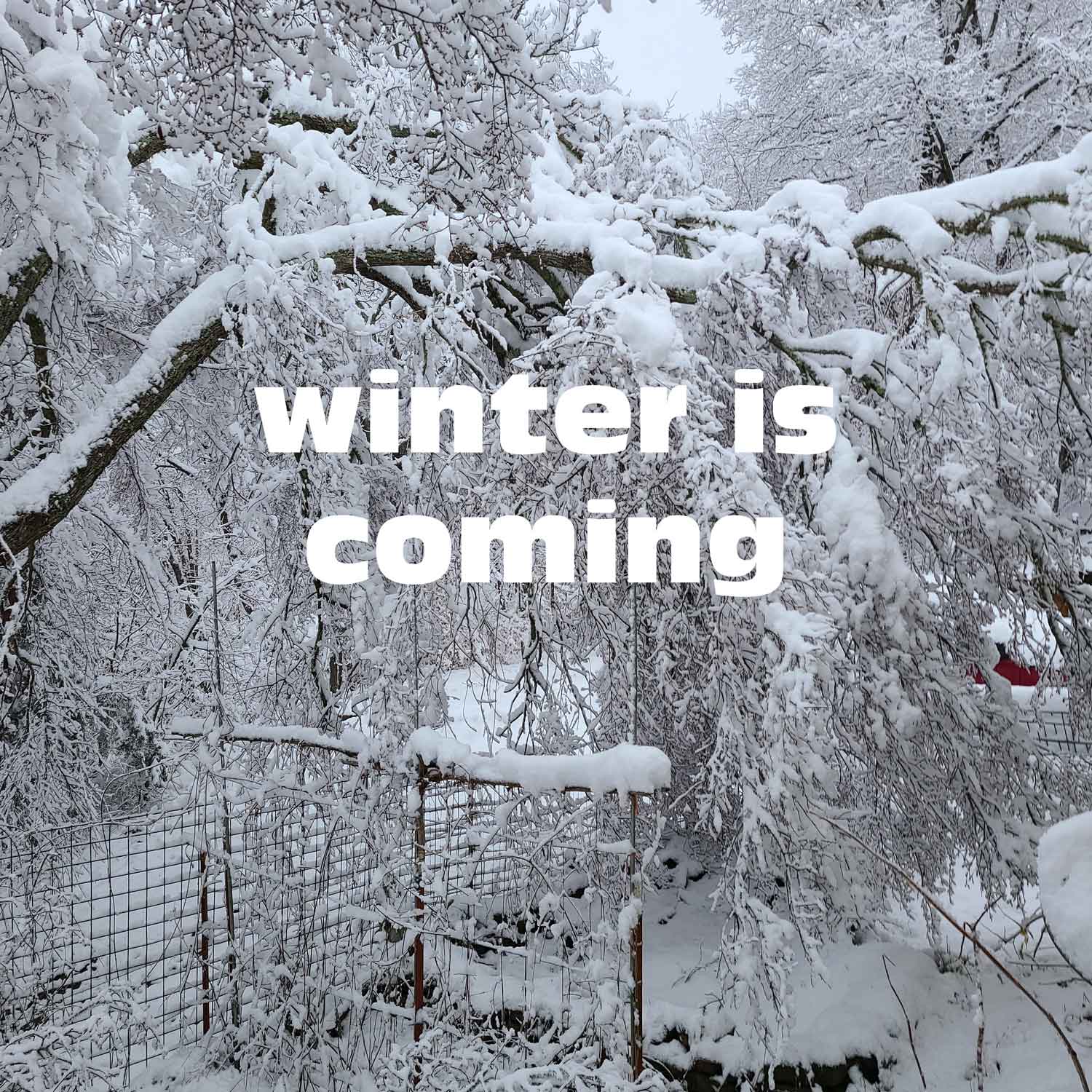When you live a remote and rural life far down dirt roads, you need to prepare for winter. The old adage ‘prepare for the worst and hope for the best’ definitely applies here. You will thank yourself later for being proactive. During ice storms will be where this planning helps the most, but it also applies for snow storms if your road isn’t plowed, and prolonged below-freezing spells.
Winter is coming. And there are things to do ahead of time to prepare for it if you’re living the remote life. If you live near pavement, your county probably at least keeps the roads cleared, so some of these items may not be as critical.



These are the areas of focus and the things we do ahead of time to get ready for what we hope will not be a brutal winter. And yes, I realize the Ozarks aren’t like the Rockies. But the consequences can be severe even here in our little hills, all the same. Winters here offer lots of beauty, too, though.
Heat
firewood
Assuming you have a wood-stove or fireplace…
We start splitting firewood in summer, but still sometimes have to go out during a snow or freeze to do some more. One year my husband and I spent the morning waiting for the temperature to at least get above 10*F so we could go out to split some wood without freezing to death while we did it.
It’s important to have a space to keep firewood dry. Wet wood won’t light. And speaking of lighting…
firestarter
Start gathering fatwood or kindling during summer, too. Or stock up on the fire logs from the store. We use those by cutting off little chunks of it to get the fire lit. Another option is to use a hatchet or sharp knife to shave off small slices of your cut firewood. There are also lots of natural tinder you can look for and collect, like cedar bark, dried yucca stalks, etc. A nice stack of firewood is no good if you don’t get it lit.
propane
Fill your propane tanks in summer when prices are lowest. If you missed that deal, then get it topped off as soon as you can. It’s nice to have propane heat if you don’t have a fireplace, but good to have to assist or back up whether you do or not. Especially if all you have is electric heat.

Water
We live on a gravity spring-fed system. It doesn’t matter how much of a drip we leave running, once temps stay near zero for a day or more, the water will freeze from the tank 300′ up the mountain to the house and every faucet within.
I learned the hard way that scooping snow into buckets and bringing them inside to melt is one of the least efficient ways to get a bucket of water. It’s one of those things that seems like a good idea, but doesn’t work so well in practice. The conversion ration is pretty poor. So start putting up water before the freezing temps move in.
Also learned the hard way that it is particularly punishing to haul jugs to the creek, bust holes in the ice, and fill jugs that way. But at least it does bring home gallons of water at a time – far better than melting snow.
You’ll find out that you use a lot more water than you thought, once the only water you have is what you’ve stored for emergencies like this. You’ll need water for the following:
- Drinking-our spring water is ‘living water’, so for storage it also needs to be boiled.
- Washing
- Laundry
- Flushing
- Medical Emergency – this water needs to be sterile. Boil and can it just like anything else. Store it on the shelf and if you have a first aid issue, open this water to wash wounds, rinse eyes, etc.
You’ll learn how to be VERY economical with your water usage after the first time you run out and have to either melt snow or break ice to get more. Believe me. Here’s a post I wrote about how to wash dishes with limited water:
https://www.wildozark.com/limited-water
For the Animals
Don’t forget to consider your livestock and pets’ emergency needs during episodes of rural winter when you’re unable to get out to town:
- Water
- Shelter
- Food
- Heat
What if You’re All Electric??
Then you could face a literal survival situation. If the power goes out, and it usually will especially during ice storms, you will need to have a really good emergency kit and knowledge for dealing with the cold. That kind of survival is beyond the scope of this article. Needless to say, I don’t advise remote living without some form of heat besides electricity.
While we do have a hefty solar array (not the single unit in the photo, lol) and an equally beefy battery backup, heavy snow and overcast snow weather can present a problem. So we have firewood and propane for heat, as well as electric mini-splits.

Little Things that Make Big Differences
snow melt or cat litter
We use a calcium based snow melt on the steps, but if you don’t keep the steps swept clear, the melt doesn’t help a lot. Cat litter helps to offer some traction on slippery spots where snow has melted and refrozen.
ice cleats for your feet, chains for your tractor
Ice cleats that fit over your winter boots are literal life-savers. Until I got a pair, the slippery slope to feed the horses was truly dangerous. When we can’t even walk outside, there’s no way to drive to the hospital for a broken skull or arm.
Chains for the tractor means you can use the tractor to bring the hay to animals or go down the driveway when it’s icy. Otherwise, you’ll end up down at the bottom of the ravine on the rocks.
Everything is easier, if not pleasant, when it’s just snow. But here in the Ozarks we do get some serious ice storms sometimes. Here’s my review of the ice cleats I have.
extra gloves, jackets, boots, socks
When the snow is wet, I go through a lot of jackets and gloves. We stretch a clothes line over the woodstove to dry them between use, plus it keeps them warm. To be on the save side, don’t hang flammable things directly over the stove, though. (But the leather gloves do hang there with supervision until they’re dry).

winter survival kit for your auto
If you’re out and about when ice or snow sets in, if you have a winter survival kit in your vehicle you’ll be able to survive a mishap. It’s easy to slide off of the road in the ice, and in remote areas there might not be cell signal to call for help and no traffic going past for hours to days.
Here’s what I keep in mine:
- chocolate bar
- bottles of water
- blanket
- socks
- gloves
- hat
- cat litter (for traction)
- pocket warmers
- lighter and tender
- flashlight
Being Prepared Makes Winter More Wonderful
It was a huge learning curve when I moved from suburban south Louisiana to very rural northwest Arkansas. This post topic covers some of the most important things I’ve learned about dealing with winter in a place where it’s sometimes impossible to get in the car and drive to town because of winter weather.


Leave a Reply